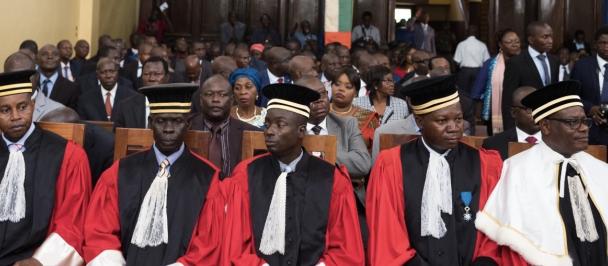Excellencies, Distinguished Delegates, Ladies and Gentlemen,
I echo previous speakers in thanking the co-organizers and other co-sponsors for this important High-Level Side Event on the margins of the Conference of States Parties on the Convention on the Rights of Persons with Disabilities (COSP).
This is a significant jumping off point for the UN system. UNDP has been proud to play a pivotal role in the development of the UN Disability Inclusion Strategy, together with the International Labor Organization and in close collaboration with the UN Human Rights Office. As co-chair of the working group, we wanted to ensure 3 things that we believe are critical to the success of the implementation of UNDIS:
- Firstly, to develop UNDIS in a truly extensive and collaborative process. Every effort was made to bring in as many parts of the UN to build a strong consensus around a common vision shared across the system.
- Secondly, to make UNDIS relevant across all pillars of the UN.
- Thirdly, to embed disability inclusion across all our operations and programming: in leadership, in policy and programming, communications, and importantly, in how we as a UN system walk the talk as inclusive employers.
At UNDP, we firmly believe that in order to support disability inclusion and the transformative promise of UNDIS, the issue of disabilities needs to be understood as a multi-dimensional development and human rights issue.
Disability inclusion cannot be approached as a standalone, it needs to be promoted across all policies and programmes.
We know as the world’s largest minority group, people with disabilities have been consistently left behind in development gains and in their participation in development processes and decision making.
Supporting implementation of UNDIS at country level will be critical in moving ahead. The foreseen development of a UN Country Scorecard to provide an appropriate mechanism to support UNDIS in the work of UNCTs, will be imperative to maximise mainstreaming, synchronise tools and ensure a streamlined process at country level.
UNDIS is an opportunity for entities to come together to support innovative approaches, to learn from best practices and lessons learned. The UN Partnership on the Rights of Persons with Disabilities, a system wide partnership that UNDP hosts the technical secretariat with 5 other UN entities, can support UNCTs’ joint UN work on disability inclusion.
As for UNDP, we have been making important strides in disability inclusion for the last two years. Our new corporate guidance issued last December, for instance stipulates the need to mainstream disability in our new Country Programme Documents. I am pleased to report that the percentage of our CPDs reporting on disability inclusion increased from 7 percent in 2017 to 48 percent in 2018.
Another important innovation is UNDP’s marker on Leaving No One Behind in data analysis of our portfolio. It includes a category on persons with disabilities and this allows us track resources over time. UNDP has worked in more than 90 countries on disability inclusion since 2008. Our new corporate guidance and disability marker will help has further progress in mainstreaming disability inclusion throughout the organization.
In closing, I would like to say that having led the process of development of UNDIS, there is clearly a tremendous momentum internally in the UN system to do more on disability inclusion. At the same time, so much more needs to be done to embed inclusive approaches and the twin and complementary frameworks of the Sustainable Development Goals and the Convention on the Rights of Persons with Disabilities.
As we move into implementation phase of UNDIS – we need to build on this momentum created. We need to also ensure strong partnerships with Organizations of Persons with Disabilities and member states to support UN efforts to implement UNDIS.
UNDP is absolutely committed to play our part to make UNDIS a success.
Thank you.

 Locations
Locations




